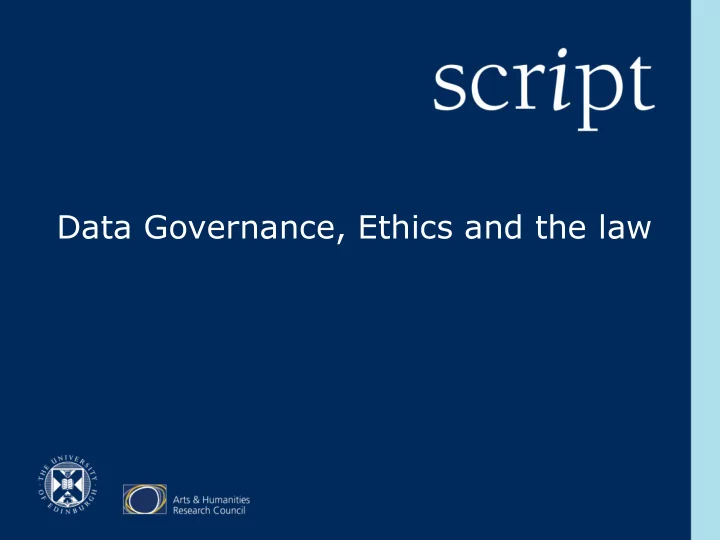

Data Governance, Ethics and the law
Ethics and law: why does it matter to computer scientists?
Costs: fines and reputation
No Buy-in by needed users
Loss of trust
• Fines (under GDPR: a fine up to 10,000,000 EUR or up to 2% of the annual worldwide turnover of the preceding financial year in case of an enterprise, whichever is greater (Article 83, Paragraph 4 [14])) • a fine up to 20,000,000 EUR, or in the case of an undertaking, up to 4% of the total worldwide annual turnover of the preceding financial year, whichever is higher (Article 83, Paragraph 5 &
• Damages: potentially unlimited
• Data breach notification duty:here goes your reputation •
Ethics and Data science • A bit like kissing in the school yard: • Lots of people seem to be talking about it • Much fewer actually do it • Even fewer do it well
What does „data ethics“ mean? • Don‘t break the law? • Don‘t break the spirit of the law? • Don‘t do harm (non-malevolence)? • Do good (benevolence) • Respect autonomy? • Be just? • Be a „good X“ (scientists, doctor, politician etc) – Noe be bad
What does professional ethics mean • Being a „good X“ (scientists, administartor, judge...) • Not violating the professional rules • Being perceived by others as exemplary • Being a „virtuous“ X
The knowledge trifeca • Known risks („known kowns“) • Known possible risks („known unkown“) • Unknown but real risks (unkonwn unkowns“)
Known risks and the law • Privacy • Property (IP) • Commercialisation and independence • Benefit sharing • Openness • FOI • Funding council guidelines: open access, replicability
Risk Management and planning tools I • SWOT • strengths , weaknesses , opportunities , threats • PEST • political, economic, social and technological • PESTLE • political, economic, social, tech; legal; ethical • STEEPLE (D) • Environemntal and demographic • SPELIT, • legal and intercultural factors
Risk management and planning tools II • Privacy Impact Assessment • Cabinett Office Big Data Analysis Tool
Cabinett Office Data Ethics Tool
Case studies
The bad • US university applicants apply for federal grants • One section of the application form asks them to rank their universities by preferenes
• Form is then shared with universities • ...which in some cases use this to reject candidates that did not list them first • Maybe worse, offered less financial suport to candidates who listed them second • Combined with browsing data from ranking websites
• Data minimisation? • Data sharing? • Consent, secondary use/purpose binding principle • Harming your clients? • Non-sustainable/harming your future data access
• Privacy • Harm to the person who supplies the data
The racist sentencing support system
• Discrimination • Violation of laws • Hidden biases • Wider social harm
The ugly
• Privacy • Autonomy • Benefits? Justice?
The good?
Citizen science – where could be the harm in that? • Citizens record noise levels on mobile phones • City makes planning decisions on that basis • (traffic calming/redirection measures)
• Who is heard and who is not heard? • Who suffers from the decision taken?
The good?
Cloudteams
• Earn points while you share • Get earlier/cheaper/free access to the apps that are developed • Make the most of your Facebook account by combining it with CT data
Possible issues • Is gameification appropriate for health data? • Risk through cumulative participation with same development team • Risk of inducing you to violate your obligations
Recommend
More recommend